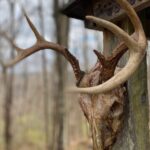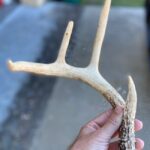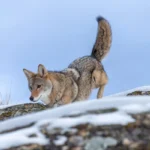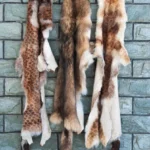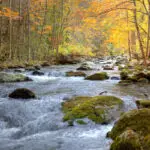Shed antlers can be found anywhere that deer or elk call home, and these natural treasures can fetch a lot of attention.
In fact, hunters, hikers, and nature lovers all over the country head out each winter or spring to collect elk, deer, and moose sheds in their area.
But did you know that antler sheds can be worth some serious money?
In this article, I’m going to talk about how much shed antlers are worth, how to sell them, and how to collect them ethically and responsibly.
Table of Contents
- How Much Do Shed Antlers Sell For?
- Quality of Shed Antlers
- Pricing Elk vs Deer Sheds
- Shed Antler Prices and the Market
- Why Are Shed Antlers Worth Money?
- How To Sell Your Antlers
- Shed Hunting Responsibly
- Conclusion
- Frequently Asked Questions
How Much Do Shed Antlers Sell For?
The price of deer and elk sheds fluctuates each year, based on supply and demand. Prices are valued based on the condition of the antler, the grade (brown, white, chalk, etc), and any unique qualities such as non-typical abnormalities.
| Antler Type | Average Price per/lb |
|---|---|
| Deer (Grade A; Brown) | $10-$14 |
| Deer (Grade B; White) | $6-$8 |
| Deer (Grade C; Chalk) | $1-$2 |
| Elk (Grade A; Brown) | $12-$16 |
| Elk (Grade B; White) | $8-$11 |
| Elk (Grade C; Chalk) | $1-$3 |
Consider that a full-size bull elk antler can weigh up to 20 pounds, a single fresh shed can be worth up to $320!
Quality of Shed Antlers
The first important thing to consider when trying to come up with a price tag for a shed is the quality of the antler. All antlers, both from deer and elk, will get graded by an antler buyer and the price will go up or down depending on the grade of the antler.
Once the antler is graded, it is then weighed to determine just how much it is worth.
Shed antlers are graded into three basic categories: brown, hard white, and chalk. Sometimes you will find those that give subgrades to each of these categories, but in general, you can expect these three grades to be given to any shed antler you may find. Brown antlers are the freshest and worth the most, followed by hard white and chalk.
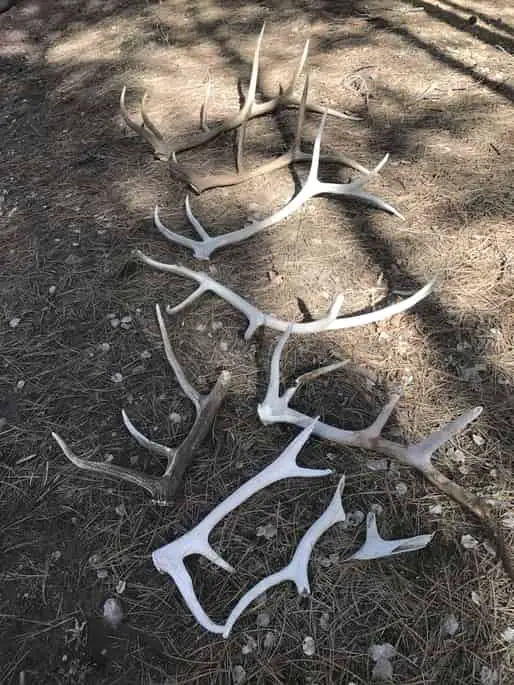
As you can imagine, brown antlers are worth the most considering they are the freshest antlers that have been found. These antlers are in perfect condition and have been dropped by a deer or elk in less than a year. Brown antlers demand the highest prices for both deer and elk.
Browns are followed by hard white antlers, which are sheds that have been laying out for around a year or two and have been whitened by the sun. While these antlers may be a little faded and weathered, they are still in great condition with only minor chips, chew marks, or cracks.
Grading of hard whites is often the toughest, as too many cracks or chips can downgrade it to the next grade which is considered chalk.
Chalks are the most common shed antlers to find and have been weathered and faded to the point of feeling rough to the touch. This is where the name chalk comes from, as these antlers will literally give off a chalky feel and texture.
Chalk antlers have been laying out on the ground for three years or more and are the least valuable grade of shed antlers.
Pricing Elk vs Deer Sheds
Both deer and elk sheds are graded before being sold, and both are sold by weight. You will, however, notice that there are pricing differences between the two species when you go to sell them.
Not only do elk antlers weigh much more than mule deer or whitetail antlers, but they also tend to sell for a little more per pound than deer do due to their demand.
Elk sheds are harder to find and come in much larger sizes, making them a little more desired than deer sheds. Because of this, you will see elk sheds selling for a few dollars more per pound depending on the different grades.
There are few differences between mule deer and whitetail sheds, especially when you are selling average or small antlers that will eventually end up being cut down. Regardless of the deer species, you can expect to see the same general prices per pound being offered for each of the grades.
Shed Antler Prices and the Market
So now that we know how shed antlers are graded, how much are they worth? It is important to note that the actual price for each grade will vary by region and buyer.
This is due to a large number of factors, including the market conditions of that particular year. Every antler buyer and region will vary due to the simple supply and demand fluctuations as well.
In general, brown elk antlers will sell anywhere from $12 to $16 per pound. Hard whites are averaging $8 to $11 per pound, with chalk at $1 to $3. Brown deer sheds will see prices anywhere from $10 to $14 per pound, hard whites from $6 to $8, and chalks at $1 to $2.
Every year sees different average prices, and every area will be slightly different as well.
You can always contact multiple different antler buyers in your area to get an average of the region you are in and get a better idea of prices for that shed season.
Why Are Shed Antlers Worth Money?
Shed antlers from both deer and elk continue to climb in price year after year as the many uses for them grow in demand.
Large or unique sheds are bought to be added into collections or displays, and taxidermists can use them for their creations. Many people also love to use antlers as home decor and even furniture.
You can find antlers being used to decorate homes and yards, as well as lamps, chandeliers, and even chairs made out of them.
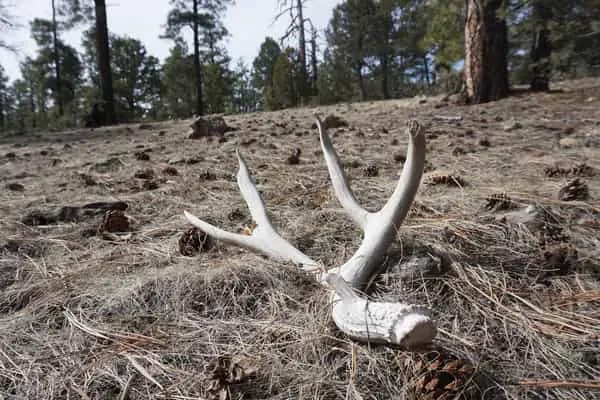
Despite the popular saying “you can’t eat the antlers” that is thrown around amongst hunters, you actually can!
Deer and elk sheds are also cut up into dog chews and treats, while the largest portion of sheds every year are exported to China and other Asian markets for their use in traditional medicine.
The medicinal use of antlers can be traced back thousands of years. Many Asian countries still use the antlers to grind up and use in different types of medicines that are mostly used to treat things such as arthritis and joint issues.
All of these different uses translate to a large demand in both deer and elk shed antlers that make prices continue to increase year after year.
And the best part is that these antlers are naturally shed, and cause no harm to the animal. It’s truly a renewable resource!
How To Sell Your Antlers
There are antler buyers (also known as brokers) all over the country, and many travel from state to state looking for shed antlers to buy. Once you have contacted one and are ready to sell some shed antlers, they will meet you and start to sort out all of your antlers and grade them.
To find antler buyers in your area, call around to local taxidermy shops, game processors, or hunting outfitters. You can also do a search online to find antler buyers, especially in western states like Colorado, Montana, Idaho and New Mexico.
See Also: Shed Hunting In Arizona: What To Know & Tips For Success!
Once the antlers are sorted, they will then be weighed together to come up with total weights for each grade you have. This weight is multiplied by the price per pound that the antler buyer is offering, and you will get your total dollar amount for that grade of antler.
Negotiation is important here. They may offer a price, and you are free to counter-offer or negotiate a better deal. The more antlers you have for sale, the more leverage you have to negotiate a better price.
If you are happy with the total price, you can then sell your antlers to the antler buyer and they will usually pay you in cash.
Other Ways To Sell Your Shed Antlers
If you cannot find an antler buyer in your area, there are other ways to sell your antlers:
- Ebay is very popular for selling sheds and deer, elk or moose racks.
- Craigslist and Facebook marketplace are also popular.
- Flea markets & outdoor trade shows.
- Pet stores, taxidermy shops and even craft furniture stores may be interested in buying shed antlers.
Shed Hunting Responsibly
Each year, when deer and elk shed their antlers it is usually at the end of a long winter when the animals are often vulnerable and weak.
If you decide to hunt for sheds, do it responsibly:
- Do not chase or pursue game animals in an attempt to make them ‘drop their antlers’.
- Avoid using ATV’s dirtbikes and other loud equipment that is disruptive and damaging to the environemnt.
- Always follow the shed hunting regulations in your area. Some states and public lands prohibit the collection of sheds, or may require a permit.
- Leave no trace, and minimize your impact. Many deer and elk shed their antlers in fragile bedding or wintering areas. Its important these habitats are left untouched for future use.
Conclusion
Shed hunting for deer and elk antlers has really grown in popularity over the past decade or so, partially due to the high prices antlers are selling for.
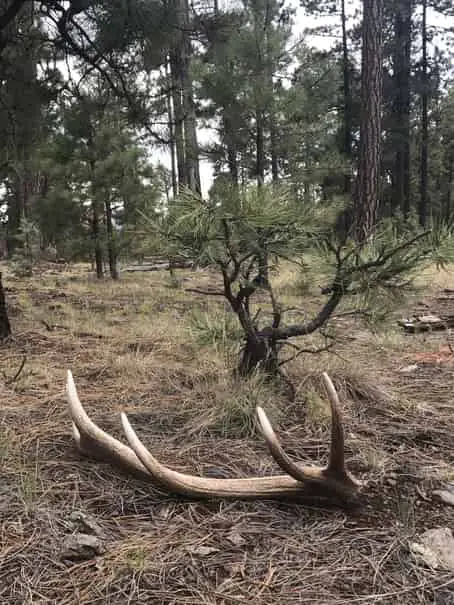
It’s important to remember if you are going to look for deer or elk sheds, to do so responsibly and ethically. Always follow the regulations in your area, and respect the game and land they call home.
Shed hunting is a great way to exercise, scout for upcoming deer season, and make a few extra bucks (or just build a personal collection, that’s what I do!).
I hope this article helped, and thank you for reading.
You May Also Like: Coues Deer Hunting In Arizona, Everything You Need To Know!
Frequently Asked Questions
How are shed antlers graded?
Antlers are graded by determining their age and the quality they are in. The more weathered and damaged an antler is, the worse grade it will get.
Do matching sets sell for more?
Matching sets are still sold by the weight unless it is a truly large or unique set that is being sold to a collector for a price separate from the weight.
Do unique antlers sell for more?
Unique or otherwise record-breaking sized shed antlers can be sold for a lot more money than if you were to sell it to an antler buyer for the weight. Many collectors and museums will pay more money for unique or very large shed antlers.
Do freshly dropped antlers weigh more than old antlers?
Antler weights are more dependent on the size when it comes to actual weights, but it is widely believed that brown antlers do tend to weigh a little more than whites or chalks that have “dried” in the sun.
How can I find an antler buyer near me?
Asking other hunters can result in finding a local antler buyer, and a quick internet search can bring up the contact information of the different buyers in your area or state. Many antler buyers are happy to travel to you as well!
